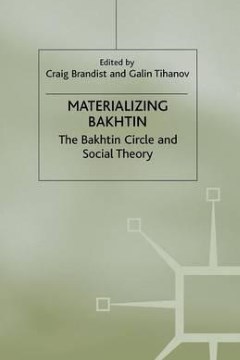Repository | Book | Chapter

(2000) Materializing Bakhtin, Dordrecht, Springer.
This study explores the background to Mikhail Bakhtin's and Georg Lukács's later work on the novel. While their writings are currently included under the increasingly discredited, although still practical, category of "literary theory", Lukács (1885–1971) and Bakhtin (1895–1975) did not think of themselves as literary theorists, for the intellectual traditions they inherited and the background they came from were those of philosophy of culture and aesthetics.1 I have opted for a comparative perspective involving the work of both the early Bakhtin and the early Lukács because this perspective does justice to the fact that the early (and the later) Bakhtin was firmly located in a German philosophical tradition which was shared and characteristically represented by Lukács.2 The main argument is that Lukács's and Bakhtin's later attention to the genre of the novel was the result of frustrated hopes of synthesizing the study of the immanent aspects of art with that of the social dimension of culture. Indeed, Lukács's and Bakhtin's early careers end with the abandonment of their attempts at a systematic philosophy of art (which remained unfinished in both Lukács's and Bakhtin's cases) in favour of an interest in the social aspects of literature. It is the predicament of immanentist philosophy of art and the attempts to move towards a more noticeable historicism and a concern with social philosophy that will claim my interest here.
Publication details
Full citation:
Tihanov, G. (2000)., Culture, form, life: the early Lukács and the early Bakhtin, in C. Brandist & G. Tihanov (eds.), Materializing Bakhtin, Dordrecht, Springer, pp. 43-69.
This document is unfortunately not available for download at the moment.



